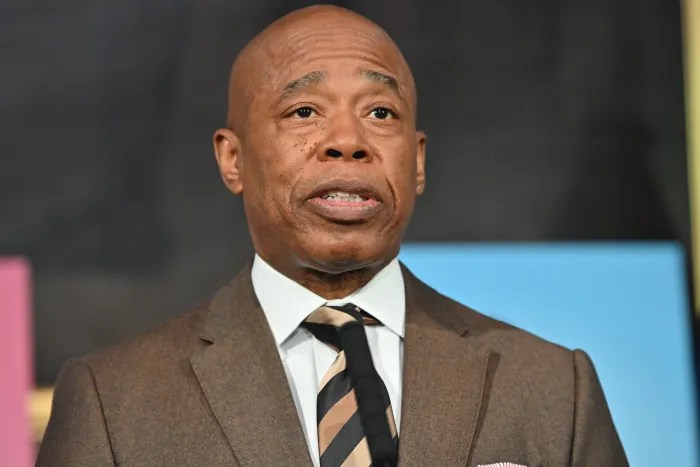
The blue wave that swept the State Senate is increasing hopes that the beleaguered MTA will finally become a focus of the Legislature.
Democrats wrested control of the State Senate on Tuesday evening for the first time in a decade, winning potentially 39 of the chamber’s 63 seats. Even though the MTA’s struggles — poor subway and bus service, mounting debt and astonishingly high project costs — did not loom large over the local elections, officials, advocates and experts believe giving all levers of state government over to the Democrats could ultimately benefit the state-controlled authority through new funding and proper oversight.
“It’s a whole new ballgame,” said Mayor Bill de Blasio at an unrelated news conference on Wednesday. The mayor has long pushed for a new millionaire’s tax as a means of paying for subway improvements — an idea that was dead-on-arrival with Republicans in control.
“From my point of view, we’re going to be able to have a kind of dialogue we never had before,” de Blasio continued. “And, of course, these are still complex issues and everything will take time, but you know I think unquestionably there is going to be a possibility now around election reform we didn’t have, campaign finance reform we didn’t have, MTA that we didn’t have.”
The MTA the state does have is in the middle of both a service crisis, bringing steadily declining ridership, and a financial crisis that could require service cuts if not properly addressed. The authority currently faces recurring deficits of more than $600 million by 2022 and is in the process of putting together a five-year capital spending plan that could cost $60 billion.
While de Blasio seeks a millionaire’s tax, Gov. Andrew Cuomo, who effectively controls the MTA, said that passing congestion pricing would be a priority in the next legislative session, to infuse the Transit Authority with new revenue. The MTA itself has stated that it will need multiple sources of new funding to close its operating budget gaps.
“The only realistic option is congestion pricing. We have to get it done. We have to get it done next year,” Cuomo said earlier this fall. “If we get the funding, we will get it done.”
The last time Democrats had control of the State Senate, ten years ago, the MTA was in a similar financial crisis. Bickering Democrats ultimately crafted a bailout plan in 2009 that fell short of a proposal endorsed by then-Gov. David Paterson, which would have added tolls to the city’s East River bridges as a means to close a $1.2 billion budget gap. The MTA then instituted layoffs and service cuts that slashed or eliminated subway and bus routes.
Today’s Democrats, some believe, will be more sympathetic to the needs of the MTA and open to new funding options that were long shots under Republican leadership of the chamber.
“I think it shifts the focus and creates an expectation that Albany will do something,” said Ben Kabak, who runs the Second Ave. Sagas blog, on Democratic control in Albany. “New York City is very well represented amongst the State Senate Democrats who now have a strong hand setting the agenda.”
Christina Greer, associate professor of political science at Fordham University, said it was still unclear what sort of priority the MTA will take in a Senate where many new members were elected in response to the Trump administration. Protecting a woman’s right to choose or expanding gun control could take precedence among those senators, she said.
As funding talks progress, that Democratic agenda must include real MTA oversight, according to Kabak and others, to get to the bottom of the authority’s bloated construction costs, which are several times higher than in peer cities like Paris and London.
Democrats have for years controlled the State Assembly, but the chamber hasn’t held an oversight hearing on the MTA since at least 2014, according to an analysis from the government watchdog group Reinvent Albany.
“Before, it could have been easily explained away as, ‘Well, some of these issues are nonstarters in the Senate chamber.’ We don’t have that excuse anymore,” said MTA board member Veronica Vanterpoool, who strongly supports oversight hearings to address topics like MTA cost containment and procurement reforms. “These are hearings that should have been happening in a bipartisan way for a very long time. But there’s no excuse now.”
Assemb. Amy Paulin, who chairs the Assembly committee tasked with holding oversight hearings on the MTA, promised to begin oversight hearings once the Legislature reconvenes next year.
“I fully plan to conduct rigorous, public oversight during the legislative session beginning in January,” Paulin said in a statement. “It is time for public hearings that will inform and educate New Yorkers about the state of the MTA, and the urgent and major steps we’ll need to take in order to solve the current crisis.”
Those oversight hearings could help answer questions on costs and spending to keep the lawmakers and the public from feeling like they’re “throwing money into a black hole” if they find new funding mechanisms.
“Right now,” Kabak said, “there’s still a big question about what it even means to ‘fix’ the MTA.”





































